Naboisho - In the design of detail
Impact at scale comes through constantly looking at the decisions we make and ensuring they are in the best interests of not just the local communities and immediate wilderness areas, but further reaching into the roots and foundations of principles and education.
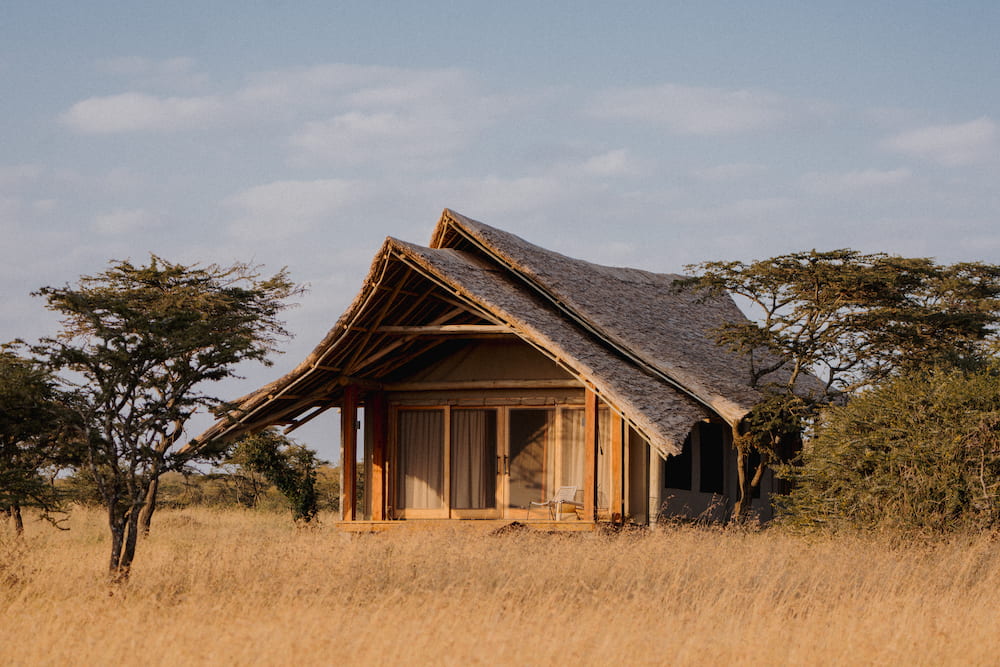
The exterior of a guest suite at Naboisho Camp, with glass sliding doors and a private veranda.
Caline
The rebuilding of Naboisho provided us with the opportunity to look towards the people of Kenya for assistance and inspiration. A handful of local artisans were contracted, each with a specific style and unique approach to their designs, but, most importantly, all providing sustainably and ethically sourced products. Our favourite interior designer, Caline Williams-Wynn, was once again at the helm. Her inspired hand had previously directed the interiors of our other Reserve Tier properties – Sayari, Namiri Plains, and Jabali Ridge – so it seemed fitting that she should once again take the lead in Naboisho’s rise to join this elite category. Working alongside our local designers, bespoke pieces were inspired and created, unique and individual to Naboisho, with the overarching connection to the land and people of this beautiful country.
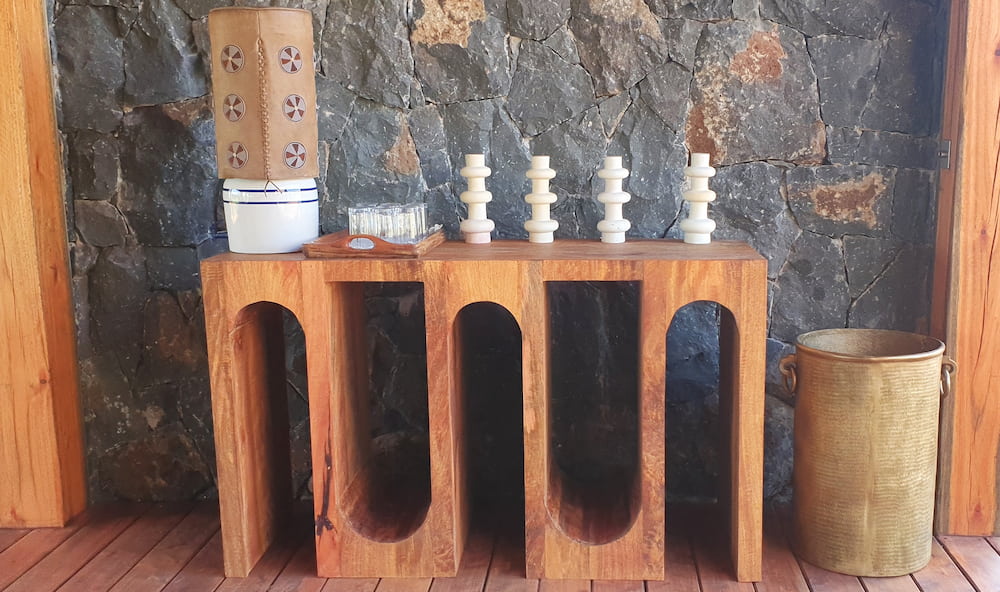
One of two mango wood console tables, made by Santana Africa.
Santana Africa
Lynn Wambui is the owner of Santana Africa, a custom furniture design company in Nairobi. “I started the business when I was 23 years old, while I was still in university. I was passionate about construction, civil engineering, and entrepreneurship but I knew it would be difficult for me to start a construction company with no certificates and very little capital, so I decided to start a furniture company instead since it's somehow close to construction, and I've loved it ever since.” Now five years old, Santana Africa employs 9 men and 2 women in the workshop where they create a variety of bespoke household pieces from beds and side tables to workstations and dining room tables. In line with our own impact positive values, Lynn insists on working only with certified timber plantations to ensure that all wood supplied to her is ethically sourced and is not being illegally removed from Kenya’s forests.
“I love to see how my team is proud of themselves when they make something they thought would be impossible to make.” Lynn Wambui
Together with Caline, Lynn designed and produced 22 custom side tables to feature in the new Naboisho guest suites, and a 2 beautiful console tables for use in the lounge areas. The carving patterns are of Swahili origin, ensuring a distinctly East African feel permeates the design. The locally sourced mango wood is from a sustainable plantation in Malindi, on the Kenyan coast, further contributing to the support of local enterprise and community empowerment. On speaking about the partnership with Asilia and the featuring of her products in Naboisho, Lynn recognises the camp as being the perfect showcase as it exposes the artisanal skills that Kenya has to offer, alongside the wildlife, landscapes and food that the country is already renowned for. Many lodges and hotels in the country have chosen to import furniture and accessories, not realising that a better-quality alternative can be produced at home.
“The intentional way in which they sourced their products speaks right into our ethos of transparency in sourcing and understanding where your materials come from.” Wamuyu Ndegwa
Tira Studio
Tira Studio, in Nairobi, aims to become an industry leader in sustainable furniture manufacturing. An overarching belief that the materials matter, speaks not only to how the materials are sourced but also to the quality of the product produced. To this end, only sustainably sourced wood and recycled steel are used in their production, creating furniture that is aesthetically pleasing, in balance with the natural environment, and built to last. Owner and founder, Wamuyu Ndegwa, employs a small labour force of artisans possessing skills in hand carving and traditional sculpture, allowing for the continuation of skills amidst an age of mechanisation. Additionally, Tira Studio has partnered with local technical collages, offering internship positions to students studying carpentry and joinery. With a background in interior design and experience as a designer, Ruth spotted a gap in the market for sustainable, well-designed furniture.
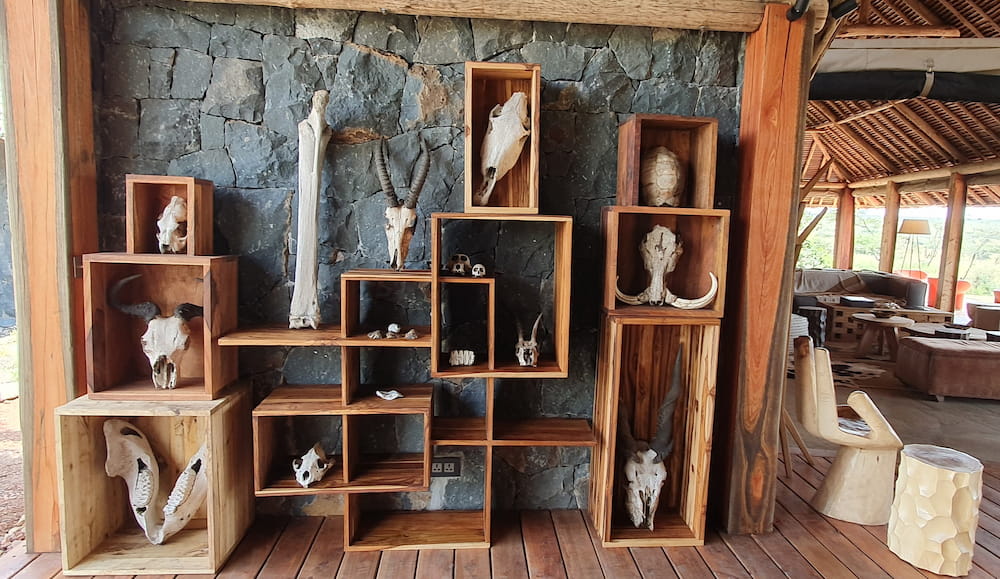
The wooden display case at the entry to the lounge holds a variety of interesting pieces found in the conservancy.
Tira Studio worked with Caline to produce a number of items for the new Naboisho, including two mango wood dining room tables featured in the expansive family suites, and an impressive display unit used to house animal skulls found in the conservancy. Consisting of a variety of different sized display areas, the wooden unit is designed to be functional and robust whilst allowing the grain and quality of the wood to shine, making for a visually striking piece of furniture.
“We use design to ensure that our products offer maximum functionality, comfort, and ease of use, and that they are also durable so that they do not need to be replaced quickly.” Wamuyu Ndegwa
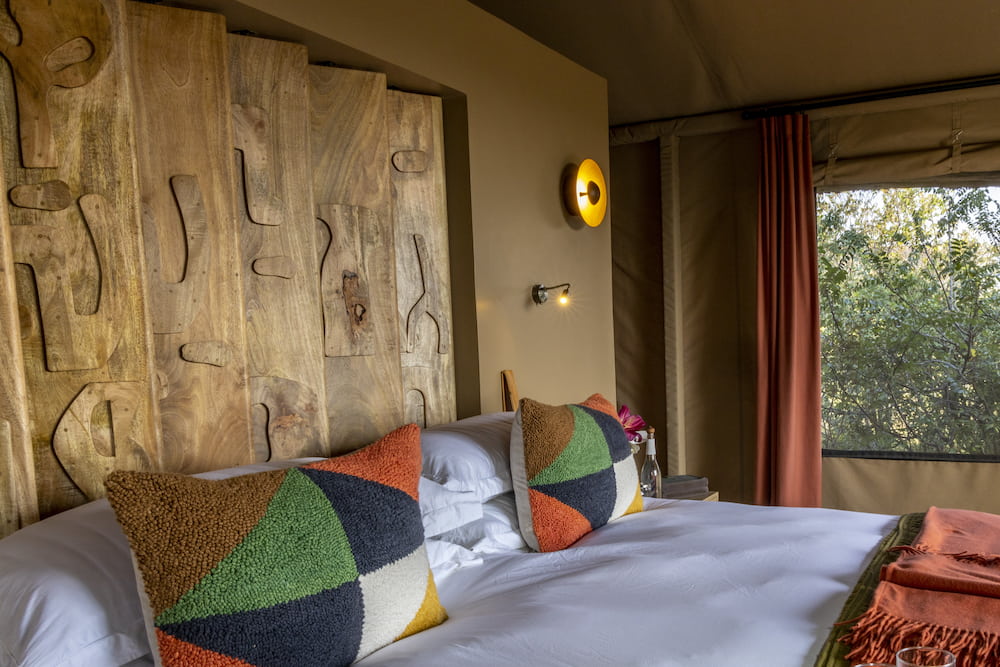
The carved wooden shutters in the guest suites, made by Savannah Space.
Savannah Space
One of the key design elements within the new guest suites, are large wooden shutters acting as a dividing wall between the dressing area and the bedroom. When closed, they offer a sense of warmth whilst providing a beautiful centrepiece within the room. However, their shuttered design allows for them to be angled open, providing a view from the outdoor showers all the way through the length of the suite to the open plains of the Naboisho Conservancy beyond. An inspired design allowing for a flawless combination of artisanal creativity with practical functionality. Cherie Kihato, owner of Savannah Space, drew inspiration from the local trees and organic shapes of the conservancy for the creation of the patterns, aiming to reflect the conservancy within the interiors of the camp. Cherie went on to perfectly summarise our relationship with the conservancy as follows:
“Naboisho itself demands attention. Because the place is so untouched and raw, you’re forced to pay attention to the beauty of it, without any of life's distractions. The camp doesn’t fight with the wilderness but rather makes itself a part of it, which is one of the things I appreciate most about Asilia’s general aesthetic. This is what attracts organic and genuine attention from people from all over the world.” Cherie Kihato
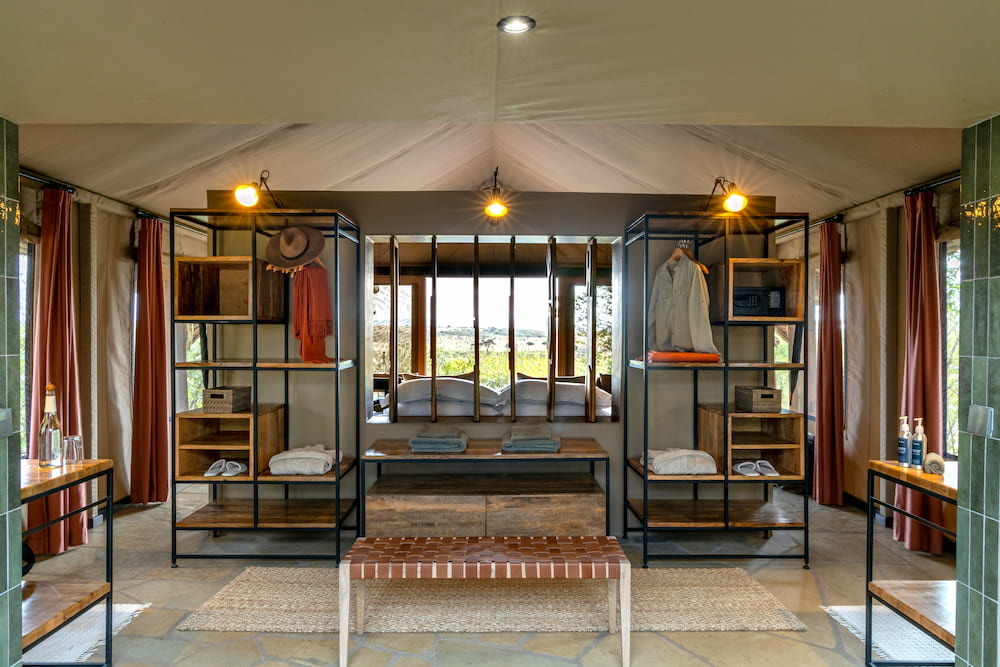
When the shutters are open, it allows for a view from the outdoor showers through the suite to the plains beyond.
Collaborative Creativity
Naboisho, meaning “coming together” in Maa, was named in celebration of the landowners who agreed to pool their land together for the sake of sustainability and conservation, resulting in the creation of the Mara Naboisho Conservancy. The collaboration of creativity seen in this process of redesigning Naboisho Camp feels appropriate for the location, as inspired individuals pooled their resources and knowledge, resulting in an array of beautifully made custom pieces and local design. There were many others who contributed to the stunning interiors of Naboisho Camp: the ladies of the Maa Trust with their beautiful and intricate beadwork, the skilled artisans at Masawe Furniture, and the incredibly talented hands at Lucidity Artisanals. Under the watchful eye of Caline Williams-Wynn, the team came together to create the beauty that lies in store for you at Naboisho Camp.
More Destinations Articles

What’s the difference? National Parks, Game Reserves, and Conservancies in East Africa
02 February 2020To most of us, a national park, game reserve, or conservancy are all the same...

7 Of Our Favourite Things About Lake Manyara National Park
04 December 2019Lake Manyara National Park is located in Tanzania's Arusha and Manyara region...

Naboisho: Home To The Mara’s Newest Pool
28 November 2019Naboisho is now home to the Mara Naboisho Conservancy’s newest pool. During t...

Guest Gallery: The Serengeti At Its Best
27 November 2019We recently had the pleasure of welcoming guests, Chris and Monique Fallows t...





